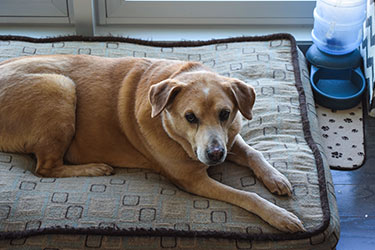Healthy Weight Week

New Year’s Resolutions aren’t just for humans anymore.
In observance of Healthy Weight Week January 14-20, help your clients understand the impact even a pound or two of weight gain can make on their pets’ health and wellness.
Fa-la-la-lots of food can mean holiday weight gain in pets
While humans, on average, gain one pound over the holiday season, adults who may be overweight or obese tend to gain five pounds over the holidays. The aftermath often includes the obligatory New Year’s resolutions to eat less, exercise more, or simply make better food choices. The same can apply to pets, as well.
The Association for Pet Obesity Prevention (APOP) estimates 59% of cats and 54% of dogs in the U.S. are overweight or obese. Are your clients fully aware of the increased health risks presented to their pets, from skin and respiratory disorders to diabetes, arthritis, kidney dysfunction, and even cancer?
Make healthy weight and nutrition goals part of every office visit
In observance of Healthy Weight Week January 14-20, help your clients understand the impact even a pound or two of weight gain can make on their pets’ health and wellness. The World Small Animal Veterinary Association offers a Global Nutrition Toolkit to help you easily incorporate nutritional assessments and recommendations into every patient visit.
Are your clients aware of how many calories their pets need each day? Nutrition guides listed on packaging are often formulated for active adult, unaltered animals. Those inactive couch potatoes you see each day are more likely to be overfed by as much as 20 or 30 percent! Simple tools like body condition score charts can help pet owners who are used to seeing chunky pets understand the difference between healthy and overweight. This also presents the opportunity to educate your clients on the importance of measuring meals, limiting treats, and remaining active.
Nutritional assessments during annual visits also can provide opportunities to recommend appropriate supplements or specialty foods versus losing that recommendation (and potential revenue) to Doctor Google. Therapeutic and wellness nutritional products offered within the veterinary practice may be more effective than products found in retail outlets, and can increase revenue potential as well.
Resolve to help your clients keep their pets healthy and happy for life
You are your clients’ best resource for the health and happiness of their beloved pets. By adding weight assessments and nutritional recommendations during each office visit, you can help your patients live longer and healthier lives.
The American Academy of Veterinary Nutrition includes a list of nutritional resources for veterinary professionals, including:
American Academy of Veterinary Nutrition (AAVN): Members are veterinarians, veterinary nutritionists, veterinary technicians, animal nutritionists, graduate and veterinary students, as well as non-veterinary professionals interested in animal nutrition.
American College of Veterinary Nutrition (ACVN): Members are board-certified veterinary nutritionists working in academia, the animal feed, pet food, and pharmaceutical industries, as well as private and specialty practice.
American Association of Feline Practitioners (AAFP): Environmental Needs Guidelines: The American Association of Feline Practitioners (AAFP) and International Society of Feline Medicine (ISFM) released the Environmental Needs Guidelines in March 2013. These Guidelines are organized to provide the framework for a healthy feline environment regardless of the cat’s lifestyle.
Association of American Feed Control Officials (AAFCO): This organization provides a forum for its members and industry representatives to safeguard the health of animals and humans, ensure consumer protections, and level the playing field for commerce in the animal feed industry.
Association for Pet Obesity Prevention (APOP): Client-oriented information offered on how to assess the body weight of a dog or cat, as well as caloric needs and weight loss tools.
Before You Get a Pet: Future Pet Parent Guide: The goal of this website is to provide practical advice for people in the process of getting a pet, including budgeting for a pet’s ongoing expenses, such as pet food and routine veterinary care.
Find helpful infographics and veterinary practice charts here:
Download Pet Obesity Survey Result infographics here. https://petobesityprevention.org/2016
Find pet weight check charts and references here. https://petobesityprevention.org/pet-weight-check
Contact your Covetrus representative for more information at 855.724.3461 or online.
Sources:
http://bewell.stanford.edu/avoiding-holiday-weight-gain/
https://petobesityprevention.org/
https://petobesityprevention.org/pet-weight-check
http://www.wsava.org/nutrition-toolkit
http://www.aavn.org/nutrition-resources/
Careers
Are you looking for a place to let your talents shine? At Covetrus, we help our practitioner customers better serve their patients and take pride in providing the best customer experience possible. Search our open positions to see our available opportunities.
Newsletter
Stay current with what’s going on with Covetrus, subscribe to receive our newsletter and email communications. Subscribers will receive the latest information in practice management, sales and marketing, animal health, and more.


Leave a comment